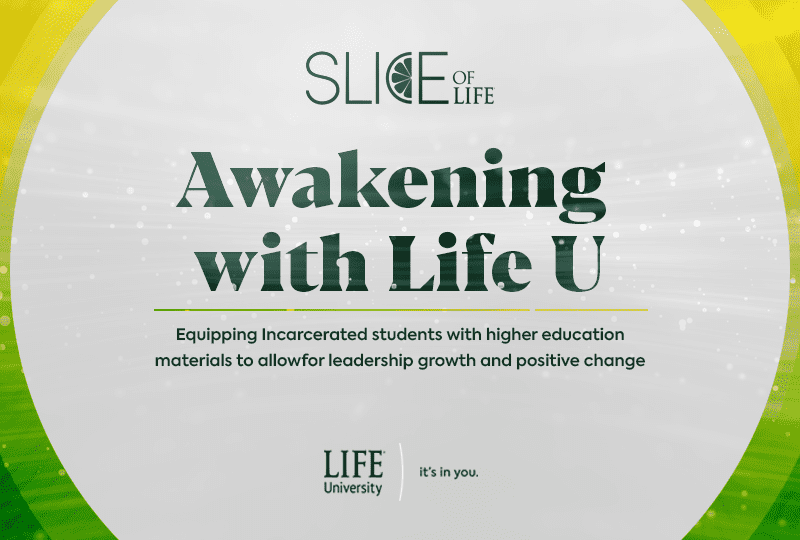![steven clark awakening[26]](https://living.life.edu/wp-content/uploads/2022/06/steven-clark-awakening26-scaled.jpg)
Life University (Life U) has an admirable commitment to promoting the well-being and empowerment of incarcerated people because of an institutional ideal that all people deserve access to educational resources that enable them to thrive personally while building the world they wish to see.
At Life U, we recognize that universities have a special vocation to share resources with people who are impacted by prejudiced systems, including people affected by mass incarceration and systemic exclusion from access to education.
To that end, it is very exciting to see the progress made by Steven Clark, an incarcerated individual currently pursuing an M.S in Positive Psychology with Life U.
“As an incarcerated citizen, Steven is constantly faced with many challenges, especially during the COVID pandemic. However, Steven has proven to be resilient in the face of adversity and truly exudes and applies the principles of positive psychology,” said Dr. Richard Shook, Assistant Professor of Psychology. “He works hard to transform theoretical concepts from mindfulness and compassion into a living and breathing program that helps incarcerated citizens experience more equanimity and meaning in their lives.”
As part of his master’s program, Clark has created a positive psychology and coaching program at Maine State Prison. The program, titled “The Awakening: Transforming from the Inside Out,” is based partly on Life U’s Awakening Mentorship and Coaching program with guidance from the Life U Psychology Department.
“We have utilized kind of the teacher archetype, where we let individuals within the prison contribute to what the program is and the development of the program itself,” said Clark.
Currently, there are nine individuals involved in the program and 16 potential modules in progress intended to be utilized for the curriculum. Modeling some operations from the International Coaching Federation’s ethics and guidelines framework, the program has been in place since June 2021 and works with participants to create and tweak robust modules for future use.
On April 22, 2022, Clark hosted both an on-site and Zoom-based capstone presentation of the project entitled “The Awakening Program: An Inmate Collaboration to Transform Self, Community, and the System of Mass Incarceration.” The in-depth scholarly presentation, open to leaders and professors, detailed the goals and intentions of The Awakening Program. Resources and slides presented can be accessed through the Glen Community Exchange.
In his presentation, Clark highlights how incarceration ideally should focus on rehabilitation, not necessarily punishment. The Awakening also explores how every person is in some sort of bondage, whether it is a physical place or an affected mental state. But by having self-awareness of one’s traumas and pain, a person can start to develop strategies to deal with stress in healthy ways and in turn serve as a light for others.
There are a few shining examples of how The Awakening program has been put into practice. A meditation group now meets regularly, led by an incarcerated resident equipped with materials that might not have previously been easily accessible. A consciousness study group examining Bruce Lipton’s ‘The Biology of Belief” is in effect as well, in addition to numerous opportunities for peer mentorship in a life coaching format.
Though not the main goal of the program, part of the hope for programs such as these revolves around relief related to high recidivism rates. Ideally, when given a chance to better themselves, more incarcerated people can rise to the challenges that will face them after they get out. Then they can help not only themselves to become positive forces for change in the world, but also encourage others to choose brighter paths.
“We have a 60 to 80 percent recidivism rate within the system of mass incarceration. If any one of our highways had a 60 to 80 percent fatality rate, don’t you think they would shut that highway down to look at what was going on and maybe make some changes?” asked Clark. “The thesis of this thing is [positive practices such as] yoga, meditation and prayer allow change to happen from within, and then we affect the environment that we are in. If within the system of mass incarceration, we can help incarcerated residents become change agents themselves, that change is going to spread out.”
Similar to the goals of the Chillon Project, an initiative of Life U’s Center for Compassion, Integrity and Secular Ethics (CCISE) that allows women in Arrendale State Prison to pursue higher education through Life U, Clark’s program enables incarcerated people to reflect on past and present experiences in order to improve on the future.
“What we have been doing for a long time in the system of mass incarceration is broken, so we need a change. We need to start spreading love, kindness and compassion to those in the system,” said Clark.
Clark has expressed gratitude for all he has learned and will continue to learn through his M.S in Positive Psychology degree, in that it has “broadened his consciousness to a place where he understands healing modalities and how they need to be implemented in all marginalized populations.”
In addition, his studies have grown his skills and aptitude to deal with many unexpected challenges, a needed asset in his current space. The Awakening program and Clark’s master’s degree should serve as a viable springboard for the work he will be required to complete as part of his Ph.D. program with the California Institute of Human Sciences.
Going forward, Clark wishes to explore how positive consciousness plays a role in marginalized populations and what strategies can be implemented to improve consciousness in these populations.
Slice of LIFE is an invitation to and extension of everything happening at LIFE University. Whether you are a current student, a potential freshmen, or a proud alum, Slice of Life can help keep you connected to your academic community. Know of a compelling Life U story to be shared, such as a riveting project, innovative group, or something similar? Let us know by emailing Marketing@life.edu.


Social Media